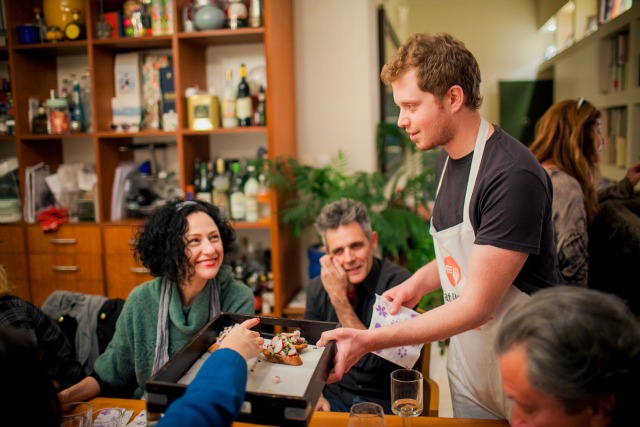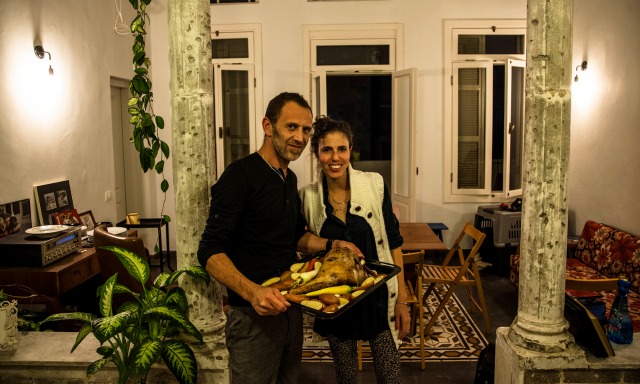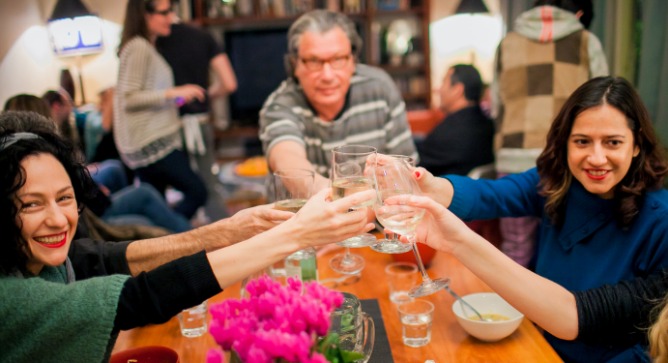Chicha is one of the vilest drinks a tourist will likely come across. It’s pre-chewed, saliva-enhanced Peruvian beer. So why try it? Because it’s authentic. Same goes for fried tarantulas – the Cambodian equivalent of potato chips.
The essence of traveling is to learn about other cultures – and food is an important part of that learning experience, whether you’re sampling diehard out-there native treats or more “normal” dishes.
Spread the Word
• Email this article to friends or colleagues
• Share this article on Facebook or Twitter
• Write about and link to this article on your blog
• Local relevancy? Send this article to your local press
Two Israeli startups – HomeDine and EatWith– have ignited a hot trend by enabling travelers to taste foreign cuisine at the homes of local hosts rather than in restaurants.
“This is the cool and new thing to do,” EatWith founder Guy Michlin tells ISRAEL21c. “It’s about breaking bread together. We didn’t invent this concept of coming together for food but we’ve enhanced it.”
Both startups match hungry tourists (or anyone else, for that matter) with locals willing to cook for them. It is about celebrating and sharing food while creating new experiences for all those at the table.
“Food is a universal language spoken by everyone. Food is the way you can express what your region and culture is all about,” says Alex Kane, marketing officer at HomeDine. “We want to offer that chance for people to go somewhere and learn about culture and food from real people.”
A new foodie community
It was 2010, and Michlin — who has traveled to more than 30 countries – was on a family vacation in Greece. Touristy restaurants were losing their appeal, and then a friend of a friend’s acquaintance set up the Michlins with a local family for dinner.

“They were so excited to host a traveler for dinner that they invited their neighbors and their cousin from Athens to join. We were there for over four hours. They offered tips on places to visit, about restaurants where the locals eat,” says Michlin. “It was the highlight of my trip.”
When Michlin came home to Israel he started to tell people about his idea of creating a global community of guests and hosts willing to share a meal together. “People thought I was crazy,” he says.
But his friend and EatWith co-founder Shemer Schwarz – formerly of XIV Information Systems, which was sold to IBM – thought it was a great idea and saw its potential for starting a new travel trend.
They built a website that would match hosts wanting to share their cooking with guests wanting to taste a new culture.
“The best way to enrich your connection to a place is to interact with real people in their own private spaces,” says Michlin.
In 2012, EatWith was officially launched in Tel Aviv. It raised $1.2 million in a funding round last summer, and created a worldwide buzz upon going live.
Michlin reports that although his team initially planned on communities in Israel and Spain only, people from some 86 countries applied to open EatWith communities. His team is also working on a mobile app.
“I didn’t think the word would travel all over the world so quickly,” he says. “It’s beyond any dreams I had.”
Couch-surfing for meals
Thanks to Instagram, Yelp, Twitter, Pinterest and Facebook, the so-called “food porn” trend is growing all the time. People love to post photos of meals they cooked or ate.
“People are inherently social eaters, making social media and food a perfect pair,” according to a new report on this phenomenon. “As consumers use social media to discover, learn, and share information about food, they quickly become more active participants in food culture.”

Add to that the popularity of TV cooking competitions and people’s need to show off their culinary skills, and it makes sense why EatWith and HomeDine, also founded in 2012 in Israel, have met with early success.
HomeDine CEO Sagiv Ofek, a programmer and entrepreneur, moved the company’s headquarters to San Francisco in May 2013. The behind-the-scenes work is split between there and a Herzliya office.
HomeDine has been described as the AirBnB for meals, giving home chefs a platform to invite travelers to eat with them. Kane says it’s more comparable to couch-surfing because there’s interaction between the host and guest.
“There are so many people out there who care about their food and cooking adventures. These people dream of being food stars and when their friends tell them their food is amazing and they get an Instagram photo liked 50 times — it makes them feel like a mini food star. And there are dozens of mini food stars all over the world,” Kane tells ISRAEL21c.
“It’s not the same risk as opening a restaurant, but you get to show your stuff.”
Kane hosts Taco Tuesdays in San Francisco. “It started with me and a group of six friends. We’ve had as many as 22 people come to an event. You can make new friends who like similar foods as you.”
Michlin notes that good food even overrides politics. “Two hours at dinner bring people together,” says Michlin, who recently dined with a Palestinian-Jordanian at a Spanish host’s home.
Log on, eat well
Here’s how it works.
If you’re looking for a place to eat, log on to HomeDine or EatWith and search for the city in which you live/are visiting. HomeDine also released an iPhone app in July 2013, so you can use GPS to locate your next nearest meal.
You’ll be presented with different options at varying costs – from free to pricier gourmet spreads. Sample meals on EatWith or HomeDine include a typical Israeli dinner in Jerusalem for $32; a Thai-Brazilian feast in Sao Paolo for $27; a traditional Portuguese lunch in Lisbon for $45; or an organic vegetarian Italian meal in Oakland, California, for $7. Click on a choice, pay and enjoy.
If you’re a host, post the meal you want to serve, cite how many people are invited and set a date and price. Hosts pay EatWith 15 percent and HomeDine 10% off the top as an administrative fee.
Both EatWith and HomeDine say they vet hosts and guests to weed out unsavory people.
The new food communities, while initially aimed at tourists, have become so popular that they are now open to locals and foreigners alike.
“It’s likeminded people who come to an event because they like food and like people. That’s the excuse for the meeting,” says Michlin. “It’s about being around compatible, friendly, open-minded people who like food.”
















